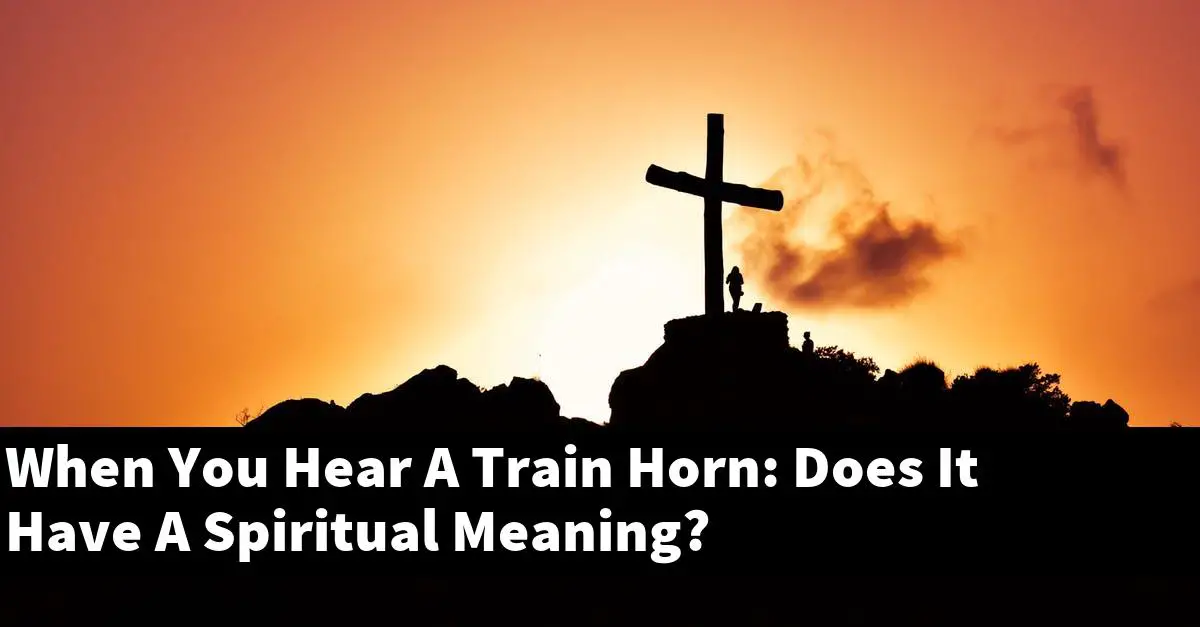Have you ever heard a train horn and wondered if it had a spiritual meaning?
There is no spiritual meaning to hearing a train horn.
Many people believe that when they hear a train horn, it is a sign from a loved one who has passed away.
What is the spiritual meaning of a train horn?
A train horn is a loud, powerful horn that is used to warn people of an approaching train. The horn is usually sounded several times before the train arrives at a crossing, to warn people that they need to get out of the way.
The spiritual meaning of a train horn can vary depending on who you ask. Some people believe that the horn is a way for the train to communicate with the spirit world. Others believe that the horn is a way for the train to warn people of danger.
Do you believe that a train horn has a spiritual meaning?
There is no one answer to this question as it is a matter of personal belief. Some people may believe that a train horn has a spiritual meaning, while others may not. There is no right or wrong answer, as each person’s beliefs are personal and unique.
If someone does believe that a train horn has a spiritual meaning, there are many possible interpretations. For example, some might believe that the sound of a train horn is a sign from a loved one who has passed away, or that it is a message from a higher power. Others might interpret the sound of a train horn as a warning or sign of danger. Ultimately, it is up to each individual to decide what they believe the meaning of a train horn is, if they believe it has one at all.
What do train noises mean?
There are a variety of train noises that can be heard while a train is in operation. Some of these noises are made by the train itself, while others are made by the tracks and infrastructure.
The most common train noise is the sound of the wheels rolling on the tracks. This noise is caused by the friction between the wheels and the rails. As the wheels rotate, they create a vibration that is transmitted through the rails to the ground. This vibration is then amplified by the surrounding environment, resulting in the characteristic train noise.
Another common train noise is the sound of the engine. The engine noise is caused by the combustion of fuel in the engine cylinders. This combustion process creates a high-pressure wave that is transmitted through the engine block to the exhaust system. The exhaust system then amplifies the engine noise, resulting in the characteristic train engine sound.
In addition to the engine and wheel noise, trains also generate a variety of other sounds. These sounds include the sound of the air brakes, the sound of the horn, and the sound of the couplers connecting the cars.
What does it mean when you hear train horns?
If you’re in the United States, you’ve probably heard train horns while waiting at a railroad crossing. But have you ever wondered what those horns mean?
There are actually three distinct horn signals that you might hear from a train. The first is a short blast, which means that the train is approaching a public crossing. The second is a long blast, which means that the train is about to pass through the crossing. And the third is a prolonged blast, which is a warning signal that the train is approaching a hazard.
So, next time you hear a train horn, pay attention to the signal. It could be a warning that a train is coming your way.
Why are some trains louder than others?
The loudness of a train is determined by a few different factors. The first is the weight of the train. Heavier trains are generally louder than lighter ones. The second factor is the type of wheels the train has. Metal wheels on metal tracks tend to be much louder than rubber wheels on concrete or asphalt. The third factor is the speed of the train. Faster trains create more friction, which makes them louder. Finally, the type of horn the train has can also affect the loudness. Some horns are designed to be very loud, while others are not.
Why are trains so loud at night?
Trains are often louder at night because there are fewer other noise sources to compete with. Sound waves travel farther and are less absorbed by the atmosphere, ground, and other objects at night. In addition, train operators may be required to sound their horns more frequently at night to warn pedestrians and other potential hazards.
What does it mean when a train blows its horn continuously?
If a train is blowing its horn continuously, it means that the train is approaching a crossing and the driver is trying to warn any vehicles or pedestrians that might be in the way.
What do trains symbolize spiritually?
Trains often symbolize travel and adventure. They can also symbolize progress, movement, and change. In the spiritual realm, trains can represent our journey through life and our connection to the larger world. They can also be a metaphor for our spiritual growth and journey to enlightenment.
Why do I keep hearing a train horn at night?
If you live near a railway, it’s not uncommon to hear train horns at night. The horns are a safety measure to warn people and animals of an approaching train.
Why do I hear train noises at night?
There are a few reasons why you might hear train noises at night. First, if there are freight trains running on tracks near your home, they may be audible at night. Second, if you live in an area with a lot of rail traffic, the noise from the trains may be amplified at night due to the lack of other ambient noise. Finally, some people may be more sensitive to noise at night, which can make even faint sounds seem louder. If you’re concerned about the noise from trains, you can try contacting your local railroad company to see if there are any steps that can be taken to reduce the noise.
Conclusion
When you hear a train horn, it might have a spiritual meaning for you. For some people, the sound of a train horn can be a reminder of a loved one who has passed away. Others might find comfort in the sound of a train horn, knowing that it’s a sign of progress and change.


